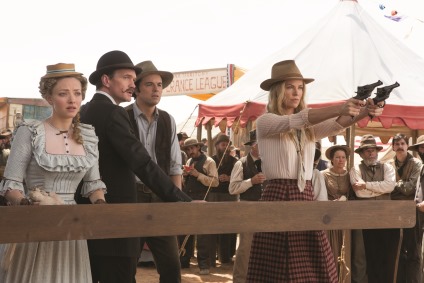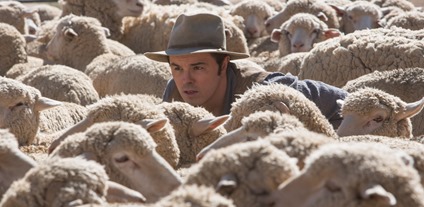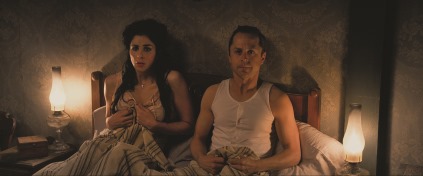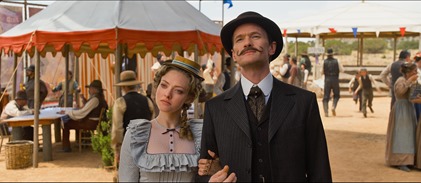Seth MacFarlane plays a guy who gets shot and dumped by his girlfriend on the same day in his Western spoof, A Million Ways to Die in the West. I’m not sure why he thought a Western would be the way to go for his second movie – and the first in which he stars – but it turns out to pretty entertaining for about ninety minutes. Too bad it’s 115 minutes long.
Albert Stark (MacFarlane) is the kind of good-natured everyman who gets the short end of the stick most of the time. He’s the guy who gets bullied and, even if he does manage to go out with the popular girl, he never scores – because he’s so decent, he doesn’t even try. He’s a twenty-first century schlub in the Old West, where everyone and everything is trying to kill you. Just to make that point even more clearly, he’s a sheep farmer.
What plot there is has Albert get shot for accidentally costing a gunslinger some money; getting dumped by his girlfriend, the town schoolmarm, Louise (Amanda Seyfried), in favor the town fop – a deliciously mercenary, moustachioed snot (Neil Patrick Harris) and, after his one heroic action ever, falling for Anna, for the unhappy wife (Charlize Theron) of the evil Clinch Westwood (Liam Neeson).
Like Blazing Saddles, which A Million Ways desperately wants to be, plot points aren’t really a big selling point here. Instead, the idea is to punch holes in a bunch of movie conventions including – but limited to – movie western, coming of age movies and romantic comedies and to do it as baldly and bizarrely as possible.
The fact that it is possible to do so with a harder edge – and more grotesquely crude humor – than it was for Mel Brooks, allows MacFarlane to do what he does best: fart jokes, poop jokes, ridiculous situations taken to absurd heights. As an example, there’s the ultimate poop joke, starring Harris, whose commitment to it keeps it funny well past the point where most other writers/filmmakers would have reined in.
Subplots are equally absurd, as with the relationship between Albert’s best friend, Edward (Giovanni Ribisi) and his girlfriend, Ruth (Sarah Silverman) – a solid upstanding Christian couple who are saving themselves for marriage, except for the part where she’s a prostitute who has no problem with talking about her job in detail.
Then there’s that titular riff about how easy it is to die in the West – the phrase uttered in all seriousness in the trailer, ‘People die at the fair!’ doesn’t even begin to cover it. Guns, snakes, tumbleweeds – death comes in forms expected and… not so much. Until Albert, fleeing from Clinch, winds up captured by Indians, A Million Ways is close to perfect – or perfectly awful if you don’t share MacFarlane’s comic sensibilities.
By this point, things have gone on just about long enough and the whole sequence with the Indians and a subsequent hallucinatory journey, though beautifully done, just slam the brakes on the film’s momentum (though I have to say Wes Studi is superb as the Indian chief whose name I won’t spoil because it is kind of a punchline in and of itself).
It’s too bad that A Million Ways goes off the rails for almost fifteen minutes before picking up again when Albert is forced to face Clinch in the street at high noon – but MacFarlane has one last ace up his sleeve and plays it here, turning the cliché into something fresh and funny.
The biggest reason that A Million Ways works as well as it does is the contrast between Albert’s very 21st Century presence and way everyone else plays it straight (well, except for Silverman, who also seems deliberately of the present). Neeson is super as Clinch, growling and snarling his way into the annals of comedy villain history. Theron shows herself to have some serious comedy chops – her timing is as good as MacFarlane’s (though he’ll probably never be as good an actor). Weirdly, MacFarlane’s style reminded me of Bob Hope (despite the disparity in taste, Hope’s The Paleface, as one example, does the same kind of juxtaposition).
Outside of the sequences mentioned, the other major flaw is that the score by Joel McNeely opens a bit too big – it feels like McNeely wants to be Aaron Copeland – but it settles onto a more appropriate level once the opening credits finish.
Some judicious editing (okay, some minor surgery) could have made A Million Ways to Die in the West a vulgarity-with-heart classic, but it still comes out ahead overall because the first ninety minutes are hysterical.
Final Grade: B+
Photos by Lorey Sebastian/Courtesy of Universal Pictures



